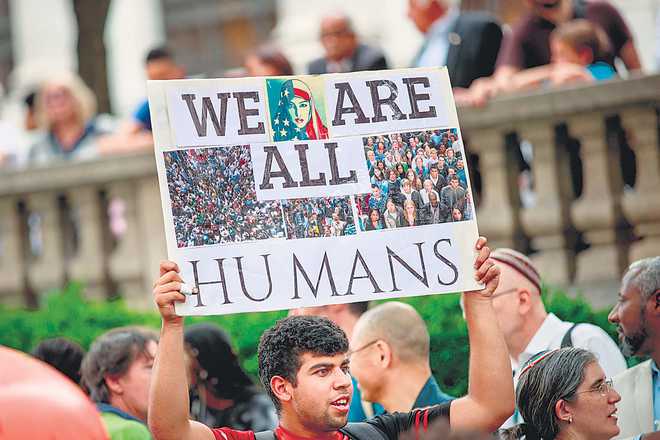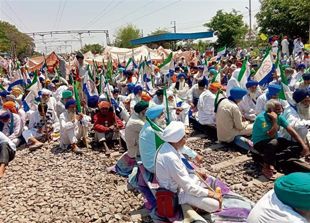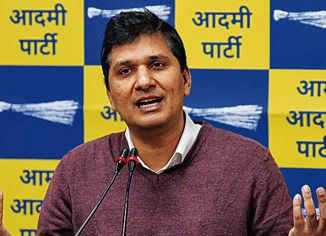
ENTANGLED: The toxic anti-immigrant mood in the US will take long to dissipate.
KC Singh
THE reported detention in the US of many Indians, including from Punjab, numbering 52 in Oregon and 45-odd in New Mexico, broke as a subset of a more shocking story. The White House had approved a policy of separating children, already over 2,300, from parents apprehended crossing the US-Mexico border illegally. US Attorney-General Jeff Sessions justified their sequestering as a deterrent against illegal crossing. Another Trump supporter likened it to “summer camps”. When High Commissioner for Human Rights Zeid al-Hussein condemned it, the US promptly withdrew from the UN Human Rights Council.
Indian immigrants’ saga must be seen against this anti-immigrant mood whipped up by President Trump pursuing campaign promises, particularly as the crucial mid-term elections to the Congress and the Senate loom, which can negate the current Republican majority. A judge issued a temporary restraining order and ruled for detainees to have legal aid. A number of non-government groups, like the American Civil Liberties Union, offered help. Xenophobia swirling in the US is likely to dissuade most persons of Indian origin, other than the grittiest, from comment or involvement, fearing the Immigration and Customs Enforcement (ICE). Asians are alerting friends and family that even legal migrants should carry documents at all times to avoid any unpleasant encounter with ICE operatives.
What role, if any, can India play? Indian consular staff has been rushed to seek access. The US will insist the detainees are being dealt with as per law, having illegally breached their borders. The detainees may also complicate the issue by seeking asylum in the US based on fictional persecution in India. This argument worked in the US and Canada, and sometimes in the UK, when Punjab faced militancy in the 1980s and 1990s. But if resurrected today, it puts the Indian Government in a bind. The detainees may have destroyed their travel documents to claim their presence in the US since long, unless apprehended while crossing border. They may also not give their true names and addresses as the US then will ask Indian missions to confirm their citizenship and seek their deportation to India once the legal challenge is lost. Their handlers would have tutored them that time is their best ally as the current Republican dominance of the US Congress may abate, or Trump may get distracted by other domestic or external squabbles.
American novelist Philip Roth who recently died, when asked about the ‘fascist hero elected President’, patterned on aviator and Nazi sympathiser Charles Lindbergh in his prescient 2004 book The Plot Against America, had stated that Lindbergh was an imposing hero while Trump was “just a con artist”. Trump is, nevertheless, President and his xenophobic immigration policy will start impacting diplomatic relations. PM Narendra Modi having become a hero of the Indian diaspora with pop-star events like at Madison Square Garden, New York, in 2014, cannot now tamely accept that US law is supreme when legal or illegal Indian immigrants are held under sub-human conditions.
Ironically, while this issue was playing out the progeny of Indian immigrants Nikki Haley nee Randhawa, US Ambassador to the UN and cabinet member, was calling on PM Modi. She was the point-person for announcing the US withdrawal from the UN Human Rights Council, as indeed the US exiting the P5+1 Iran nuclear deal. The postponement yet again of the Indo-US 2+2 ministerial dialogue, as she did her rounds in Delhi, involving foreign and defence ministers, may be a coincidence. It could also be the US reacting to India imposing duties on select US products in retaliation for US duties on Indian steel and aluminium products, or pressure on India to not buy Russian weapons systems like the S-400 missile system as it would violate the 2017 legislation: Countering America’s Adversaries Through Sanctions Act (CAATSA). The US would also be wanting India to stay clear of Iran, despite India declaring that it would only abide by UN sanctions and not unilateral US sanctions. The treatment of Indian immigrants perhaps did not figure in her call on PM Modi, but the issue may not melt away.
Emigration from India has been the standard choice of many in Indian states, particularly Punjab, Gujarat and Kerala. While those from the first two prefer Western nations or Australia or New Zealand, Keralites gravitate towards the Gulf. In fact, Malayalis constitute the single-largest group among the diaspora in the Gulf. Those without a legal status start accumulating overtime, having overstayed or re-entered on false documents, to avoid cooling-off after deportation. One study indicates that in the period 2007-09, the net emigration from Punjab was over 3 lakh. In 2001, as ambassador to the UAE, I told the then Punjab CM Parkash Singh Badal that Sikh labourers were a rarity in the UAE in 1999, but had begun to increase. This was a poor sign of Punjab’s economic health.
Thus, it is not surprising that the more affluent hazard the extremely risky illegal route into the US via Mexico or south or central America. Today, 1.5 lakh Sikhs are said to be in the US trucking business, 90 per cent being drivers. In 2017, 18,000 Sikhs entered the industry. The North American Punjabi Trucking Association estimates, according to The Economist, that Sikhs control 40 per cent of trucking in California. The same trend prevails in Canada. Truck stops now have dhaba-style outlets. As White blue-collar workers abandoned trucking jobs, Punjabis filled the gap. According to a US census, Asian-Indian population grew from 1.68 million in 2000 to 2.84 million in 2010, an increase of over 69 per cent. The xenophobia of a shrinking White majority stems from these socio-economic changes. On the other hand, joblessness, economic mess and poor governance at home in Punjab draw the youth to these distant El Dorados.
The recent detentions are perhaps the tip of the iceberg and more persons of Indian origin may be detained, including those with documents suspected to have been fraudulently obtained. The impact on Indo-US relations may be contained initially, but eventually public opinion shall drive policy. Considering other pressing issues are cluttering the Indo-US table, the detainees, like Columbus, having arrived in a land other than they were seeking, face a bleak future.
Former Secretary, Ministry of External Affairs



























